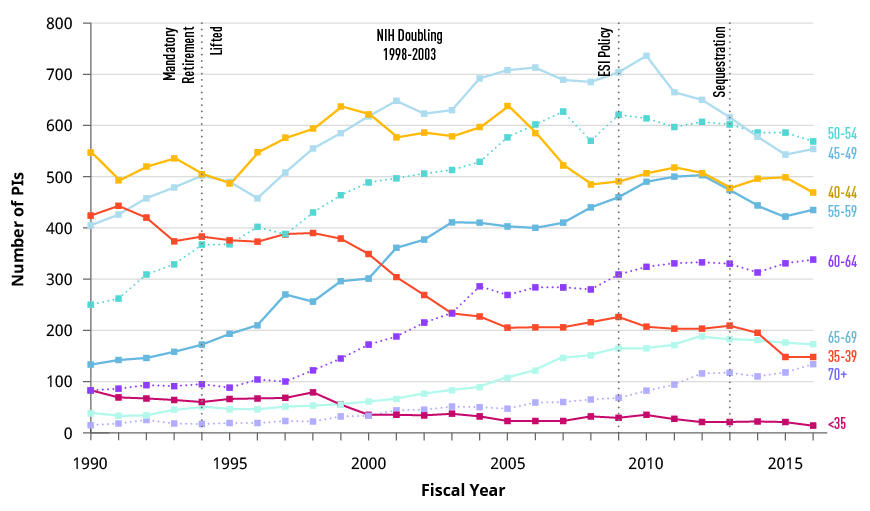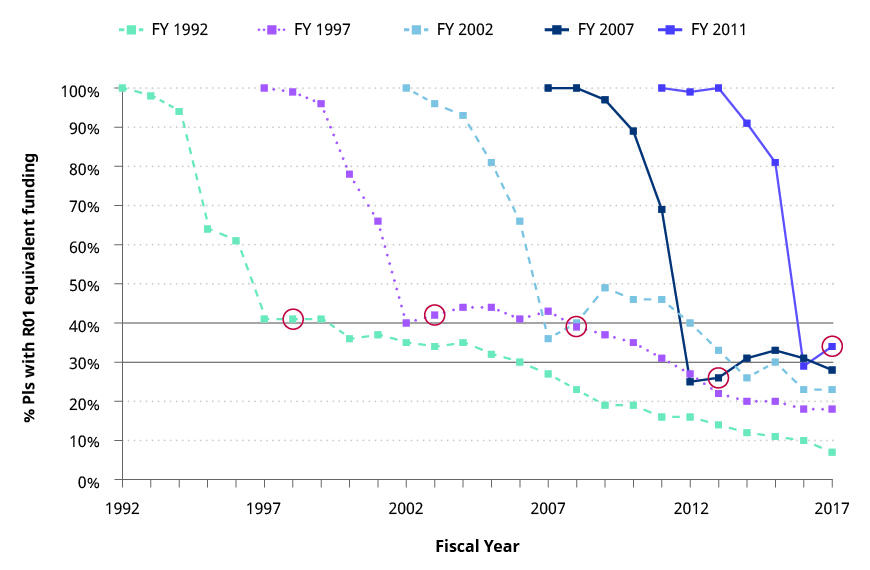Analysis Guides NCI Programs Supporting the R01-Funded Workforce
, by L. Michelle Bennett, Ph.D.
As a follow-up to a recent paper published in the Journal of Clinical Investigation, Director of NCI’s Center for Research Strategy, Dr. L. Michelle Bennett, provides a commentary on how the NCI is striving to better understand the cancer research workforce. Specifically, Dr. Bennett expands on how data from the last 26 years shows that a majority of NCI’s R01 awards are going to older principal investigators (PIs), and that early career PIs are not sustaining careers in the NCI R01 workforce as well as they have in the past.
In 2016, Congress took bold action to approve the 21st Century Cures Act, a comprehensive science and public health bill that includes the Next Generation Researchers Initiative (NGRI). Congress enacted NGRI to “increase opportunities for new researchers to receive funding, enhance training and mentorship programs for researchers, and enhance workforce diversity.” The initiative complements other ongoing NIH programs to improve opportunities for investigators in the early stages of their research careers to secure research funding.
The action by Congress and the steps by NIH to implement NGRI priorities prompted NCI's Center for Research Strategy (CRS) to better understand the funding trends of the NCI R01-funded workforce, focusing on the age and career stage of investigators. The CRS analysis gave NCI a more comprehensive understanding of how the NCI-funded R01 workforce has evolved over time. The data also informed NCI strategies to mitigate the trend of decreasing numbers of younger investigators in the pool of NCI-funded researchers. CRS published its findings April 1 in the Journal of Clinical Investigation.
CRS analyzed the career stage and demographic characteristics of principal investigators (PIs) who submitted NCI R01 applications and received awards between fiscal years (FY) 1990 and 2016 (see Figure 1). This timeframe included prominent events that affected the funding landscape, such as NIH lifting the mandatory retirement age in 1994, the doubling of the NIH budget from FY 1998 to 2003, and implementing the NIH Early Stage Investigator (ESI) policy in 2009.
Considering the effect of one prominent event, in 1998 there were relatively few awards to investigators age 65 and older. Yet, over time, the number of awards to PIs in that age group increased after NIH ended the mandatory retirement policy.
Between 1990 and 2016, CRS observed a marked decrease in awardees under the age of 40 and an increase in awardees aged 45 and above. The decline in the number of younger awardees did not result from differences in funding rates, as these rates were equivalent across all age groups. Rather, the decline occurred due to a drop in the number of younger applicants. The decline corresponds to the significantly longer periods of time between receiving a Ph.D. and receiving a first R01 award. This is consistent with PIs joining the NCI-funded workforce at older ages.
When CRS compared New Investigator cohorts before and after NIH implemented the 2009 ESI policy, the analysis revealed that a higher percentage of the New Investigator cohort missed the time-since-degree cutoff that defines ESI eligibility under the 2009 NIH policy. It appears that the 10-year time frame after receiving a Ph.D. may be too short for early-career cancer researchers. Young researchers not only train longer than in the past, but they may also be focused on setting up labs or have family-related responsibilities. For details on the definitions of ESIs and New Investigators, please see NIH’s Early Stage Investigator Policies.
When examining the retention of New Investigators following their first NCI R01 award, CRS found there was an approximately 10% decrease in the number of New Investigators sustaining NCI research funding 6 years after their initial award in FY 2007 and in FY 2011, compared with those who received their first award in the 1990s (see Figure 2).
NCI responded to this analysis by implementing new policies and programs. NCI substantially increased the payline for ESIs to assist them in starting their cancer research careers. To help ESIs sustain funding, NCI launched the ESI MERIT Award (R37) in 2018. These awards provide ESIs with highly meritorious applications with up to 7 years of grant funding so they can focus on attaining a second award and remain in the NCI-funded workforce. NCI is tracking the R37 cohorts to evaluate whether the R37 pilot program achieves its goals.
NCI is continuing to monitor the trends on age and career stage of NCI-funded researchers and to analyze workforce diversity. We are committed to tracking, analyzing, and understanding the NCI-funded workforce, which includes analysis of multiple dimensions of diversity.
NCI will soon share initial results of an analysis on grant funding by gender, race, and ethnicity. The data collected will support NCI’s ability to develop well-informed strategies and approaches that sustain, invigorate, and diversify the cancer research workforce. These efforts advance NCI’s goal of maintaining a robust pipeline of cancer scientists to provide future leadership in basic, translational, and clinical research.


